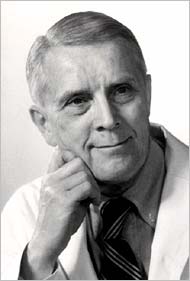 Paul Bruce Beeson, Professor Emeritus of Medicine and former Distinguished Physician at the Seattle VA Hospital, died August 14, 2006, in Exeter, NH, at the age of 97.
Paul Bruce Beeson, Professor Emeritus of Medicine and former Distinguished Physician at the Seattle VA Hospital, died August 14, 2006, in Exeter, NH, at the age of 97.
A renowned researcher, educator, and administrator, he chaired the departments of medicine at Emory and Yale and spent a decade at Oxford University before accepting the Seattle VA appointment in 1974.
With the death of Paul Beeson, American medicine has lost one of its greatest and best-loved champions," said Dr. William Bremner. "It is a loss that we feel acutely here at the University of Washington, where Dr. Beeson spent the very beginning and the very end of his long and productive academic career."
Bob Petersdorf, who had been at Yale with him and was our department chair at the time, was instrumental in bringing Beeson to Seattle as a VA Distinguished Physician in 1974. That program had been created in 1968 to bring outstanding senior physicians to the VA as consultants and educators.
Writing to then-dean Robert Van Citters, Petersdorf called Beeson “a marvelous man who will add tremendously to the intellectual atmosphere not only of the Department of Medicine and the VA Hospital but of the entire University.” That prediction was realized as Beeson made ward rounds at the VA for half of each year, attended professor’s rounds, and involved himself in clinical and educational activities throughout the system, as well as community affairs.
"Paul Beeson was a giant in medicine--by his very presence and by his blending of superb clinical care, teaching, and research," said Dr. Henry Rosen.
Early years
Born in Montana in 1908, Beeson lived in Seattle in 1915 where his father practiced medicine briefly before moving the family to Alaska. He returned to Seattle in 1925 to attend UW and in 1928 followed his brother to McGill Medical School where he received his M.D. in 1933. Following an internship at Penn and a two-year general medicine practice in Ohio, he went on to a residency at Rockefeller and chief residency under Soma Weiss at Peter Bent Brigham Hospital.
After wartime service with the Harvard Red Cross Unit in England, he joined the faculty at Emory where he chaired the Department of Medicine for six years. In 1952 he went to Yale where he was the chair for 13 years and then accepted an appointment as Nuffield Professor of Medicine at Oxford University, in recognition of which he was made an honorary Knight Commander of the British Empire.
He and his wife Barbara moved to Seattle in 1974 and settled on farmland in Redmond.
Career
Paul Beeson was a great advocate of generalism in clinical practice and as a teacher gave much attention to patient-physician relationships. He was an original editor of Harrison’s Principles of Internal Medicine and an early editor of Cecil and Loeb’s Textbook of Medicine, known at one time as Beeson-McDermott.
As an investigator, he made significant and seminal contributions in many areas of infectious disease, including the pathogenesis of fever, the understanding of pyelonephritis, the role of eosinophils in inflammation, and the mechanisms of bacteremia and bacterial endocarditis.
He was among those who discovered interleukin-1 and elucidated its role in producing fever. He wrote 123 papers on subjects from pneumococcus to priorities in medical education. Among the most prominent is his and Bob Petersdorf’s 1961 study “Fever of unexplained origin: Report on 100 cases,” published in Medicine.
Honors
He was a charter member of the Institute of Medicine, a member of the National Academy of Sciences and the American Academy of Arts and Sciences, a master of the American College of Physicians, and a fellow of the Royal College of Physicians. He received six honorary degrees, the Abraham Flexner Award, the Bristol Award, the Kober Medal, and many other honors. Yale honored him in 1981 with a named professorship, and the late Dick Root was appointed the first Paul B. Beeson Professor of Medicine before coming to UW himself.
Later years
Later in his life, Beeson’s attention shifted to issues of medical care for the elderly, medical ethics, and the consequences of nuclear weapons. He chaired the first Institute of Medicine study on “Aging and Medical Education” in 1978, and he was a strong advocate of death with dignity.
Beeson became professor emeritus in 1979 and retired from the VA in 1981.
The Paul B. Beeson Career Development Award in Aging Research was created by the American Federation for Aging Research. After his 1981 retirement, he became very active in the Seattle chapter of Physicians for Social Responsibility, speaking on its behalf around the country, and received its first Paul Beeson Peace Award. He continued his connections to teaching and at the age of 89 was still attending Tuesday conferences at the VA.
At his last grand rounds in December 1981, the medicine residents honored him for “encouraging the pursuit of the highest ideals of a physician: scholarliness, humility, compassion, and integrity.”
Since 1985, our residents have annually presented the Paul B. Beeson Award to a faculty member who best exemplifies those ideals. On that same day in 1981, the chief residents said of Beeson,
"He is the kind of physician all of us aspire to be."
Paul Beeson was the kind of physician who inspired colleagues, friends, and patients as well as trainees, and he will be remembered in our department for a long time.



